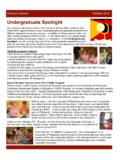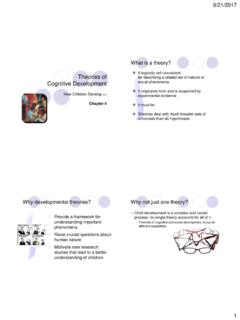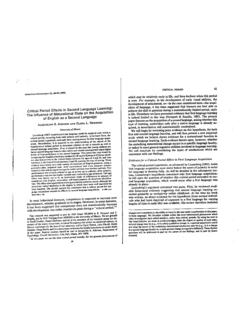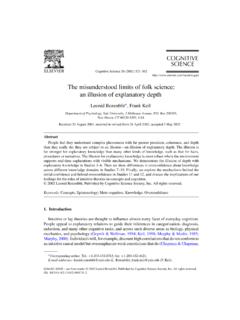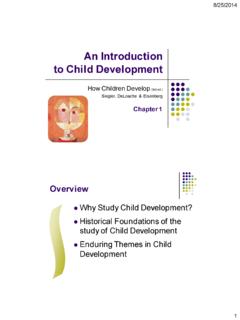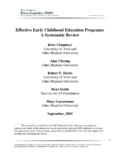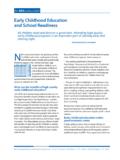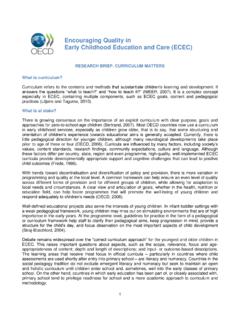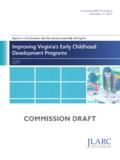Transcription of Early Learning and School Readiness: Can Early ...
1 Early Learning and School readiness : Can Early InterventionMake a Difference?Ramey, Craig , Sharon Quarterly, Volume 50, Number 4, October 2004,pp. 471-491 (Article)Published by Wayne State University PressDOI: additional information about this article Access Provided by Carnegie Mellon University at 08/08/11 3:28PM , VOL. 50, NO. 4471 Craig T. Ramey and Sharon L. Ramey, Georgetown University Center on Health research was supported primarily by grants from the National Institute of ChildHealth and Human Development, the Department of Education, the Maternal andChild Health Bureau of the Public Health Service, the Administration on Children, Youthand Families, and the Robert Wood Johnson should be addressed to Craig T.
2 Ramey, Georgetown University Cen-ter on Health and Education, Georgetown University, 3700 Reservoir Road, NW (Box571107), Washington, DC 20057 Quarterly,October 2004, Vol. 50, No. 4, pp. 471 491. Copyright 2004 byWayne State University Press, Detroit, MI Learning and School readiness : Can Early Intervention make a Difference?Craig T. Ramey and Sharon L. Ramey,Georgetown UniversityChildren s experiences prior to kindergarten entry are correlated with degree ofcognitive development and School readiness as measured by standardizedassessments of cognitive and linguistic performance. Children from economi-cally poor and undereducated families are at elevated risk for lack of schoolreadiness due to less knowledge and skill.
3 This article reviews evidence fromrandomized controlled trials (RCTs) that were designed to test the hypothesis thatpreschool education, with an emphasis on seven particular classes of experi-ences, could be efficacious in improving readiness for School and subsequentacademic achievement in reading and mathematics. Results indicate that thecumulative developmental toll that is measured reliably in high-risk samples ofchildren beginning in the second year of life can be substantially reducedthrough a high-quality preschool program. This positive effect has been repli-cated in nine additional trials using RCT methodology.
4 Additionally, long-termfollow-up of the original study participants indicates not only improved perfor-mance in reading and mathematics in elementary and secondary School butalso a reduction in special education placement and grade retention, amongother practical benefits. Results are discussed with respect to public policy rec-ommendations and suggestions for future United States continues to evolve into a society that requiresall of its adult members to be literate, proficient in basic math, andfacile with means of acquiring and using new knowledge. As automa-tion of routine jobs increases and as globalization of business resultsin the transfer of manufacturing and service jobs to less expensivempq_50-4_06_RAME_asnI 9/27/04 2:37 PM Page 471472 Merrill-Palmer Quarterlyforeign labor markets, the pressures increase to become an even moreacademically accomplished society.
5 Thus, the educational bar in K-12and college education is constantly being raised. As the educationalexpectations and the bar for minimal competence are raised, a basicproblem becomes more and more apparent. The experiences of chil-dren from different social classes lead to marked differences in skillsand knowledge as measured by standardized tests administered whenchildren enter kindergarten. These social-class discrepancies are ofno small magnitude and are strongly related to subsequent schoolperformance as indexed by standardized measures of academicachievement as well as disproportionate rates of grade retention andspecial education placement (Donovan & Cross, 2002).
6 Although thissocial class issue is frequently construed as a practical educationalissue, it is also directly germane to more fundamental issues ofhuman development, including the extent of human cognitive mal-leability and the relative importance of various causal factors whichregulate that is an ominous omen for American society that over the past twodecades approximately one-third of children entering kindergarten areconsistently judged by their kindergarten teachers as not ready for typ-ical kindergarten-level work (Carnegie Task Force, 1994). Since the1960s, the authors have been involved, along with a large number ofcolleagues from many life-science disciplines, in trying various earlyintervention strategies to understand better the causal factors involvedin the developmental discrepancies related to social class.
7 With the ulti-mate aim of improving the intellectual performance and basic socialcompetence of young children from high-risk family article is a brief summary of that work and its historical and sci-entific readiness and School AchievementSchool readiness and School achievement are at the forefront ofour country s domestic social policy concerns. How can we help all ofAmerica s children to truly succeed in School and in life? A well-educated citizenry is vital to our country s future as a democracy andas a productive and economically strong nation. Unprecedented num-bers of children start public kindergarten with major delays in lan-guage and basic academic skills.
8 Children with these significant delaysattend schools in every state; they are notconcentrated in only a fewlarge urban School districts or in desperately poor rural districts. Wait-ing until these children fail in School and then providing remedial,pull-out, or compensatory programs or requiring them to repeatmpq_50-4_06_RAME_asnI 9/27/04 2:37 PM Page 472 Early Learning and School Readiness473grades typically does notsufficiently help these children to catch upand then achieve at grade level. Instead, the scientific evidence affirmsthat children who do not have positive Early transitions to School thatis, those children who have Early failure experiences in School arethose most likely to become inattentive, disruptive, or , these same students are the most likely to drop out of schoolearly; to engage in irresponsible, dangerous, and illegal behaviors; tobecome teen parents; and to depend on welfare and numerous publicassistance programs for survival (Shonkoff & Phillips, 2000).
9 What canbe done to end this predictable decline?There is compelling scientific evidence that this negative develop-mental cascade canbe prevented. The prevention of School failure andthe promotion of children s cognitive and linguistic development can-not wait until kindergarten or until children show signs of develop-mental delay. Rather, the commitment to improving K-12 academicachievement must begin by providing children in the pre-K yearswith arich array of effective Learning scientific advances in the fields of child development sci-ence, neurobiology, and Early childhood education affirm that the earlyyears are a time of rapid growth and development.
10 Scientists are map-ping, in increasingly greater detail, this remarkable period of life. Col-lectively, these scientific findings indicate that Learning and braindevelopment are truly interdependent and that what happens Early indevelopment has lasting and important Experiences in the Early Learning YearsWhat are the crucial experiences needed in the Early years of life?Does Early caretaking or experience really affect brain development?Are these effects important or lasting? In recent scientific articles ( ,Ramey & Ramey, 1998a) and books for parents ( , Ramey & Ramey,1999a, 1999b), we have summarized a vast body of scientific evidencein terms of seven types of experiences that are essential to ensure nor-mal brain and behavioral development and School Readiness: 1.
